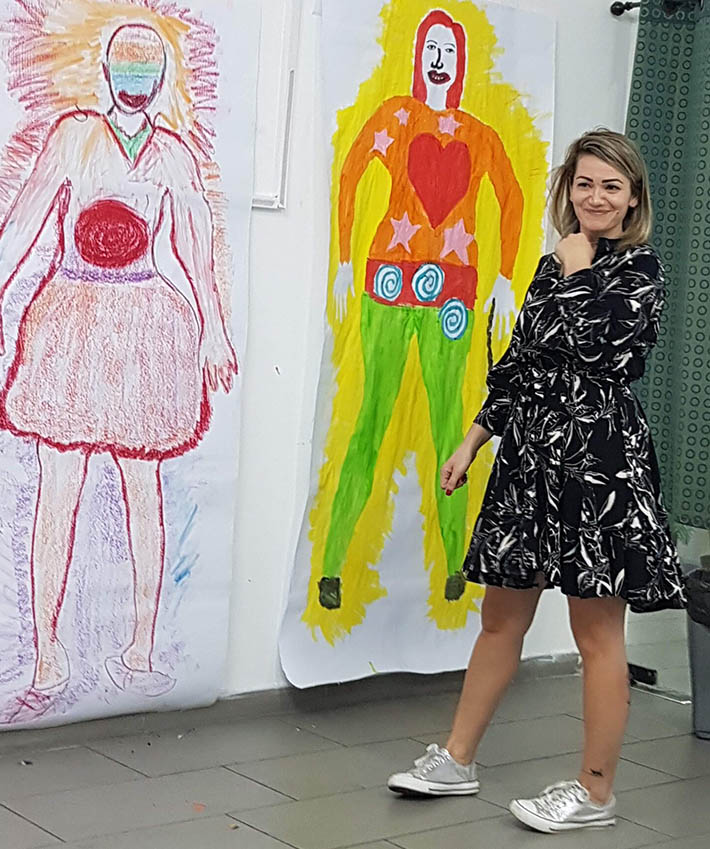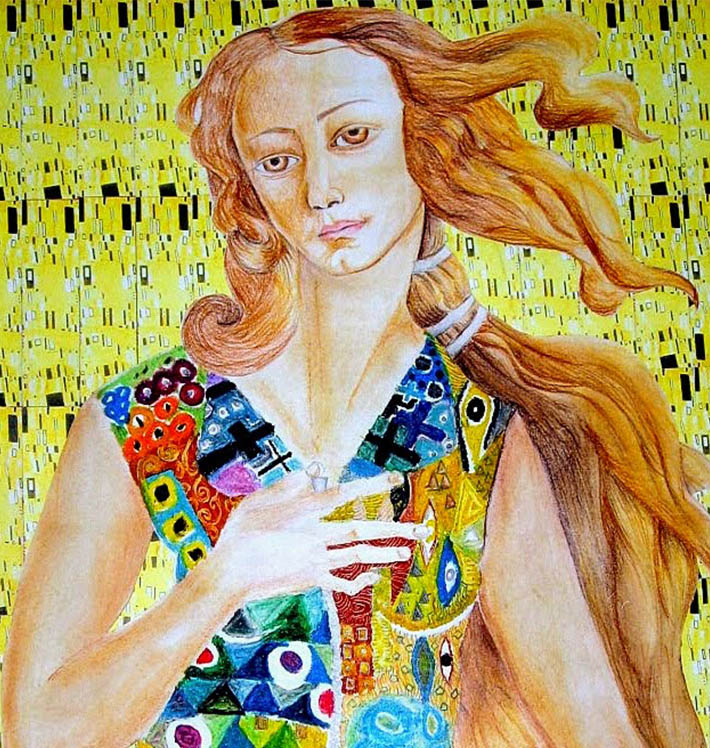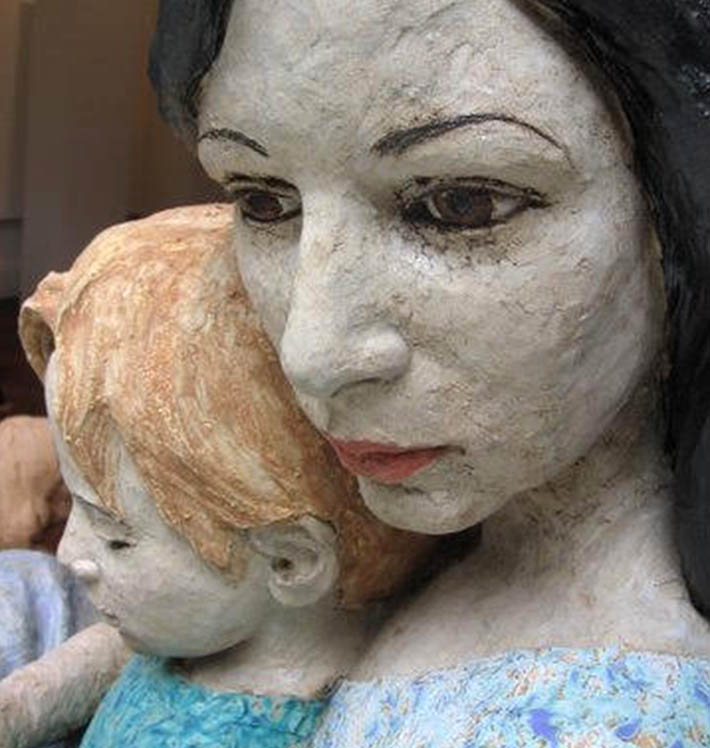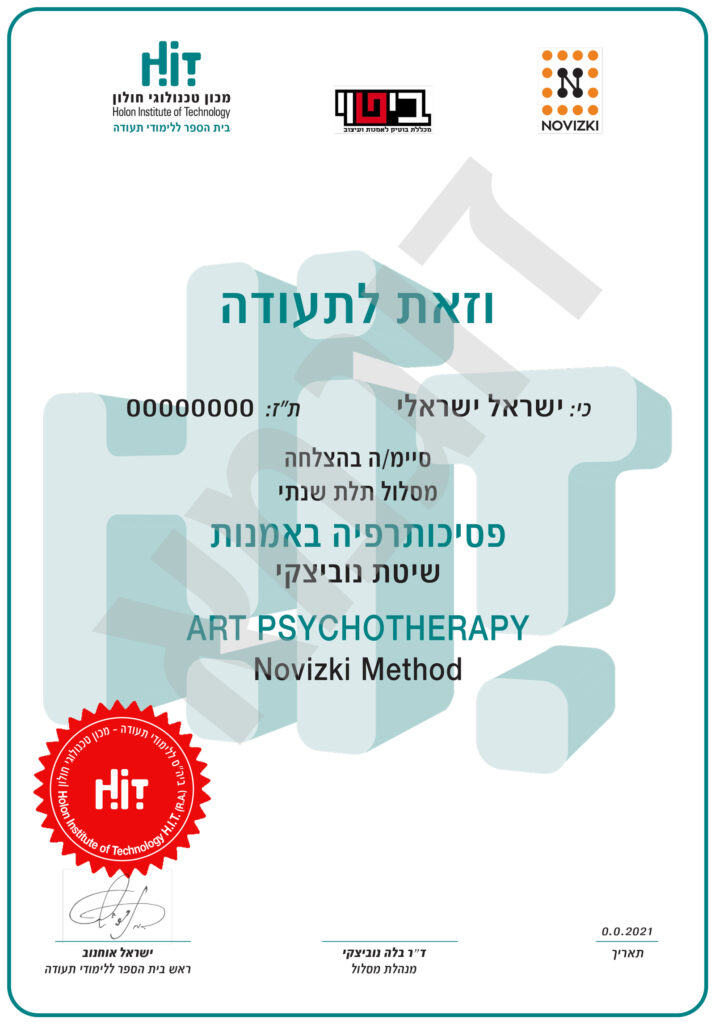
Program’s outline
Year one
NOVIZKI Core Studies NCS – therapeutic foundations of the NOVIZKI method
Year two
Online ZOOM studies – once a week for 5 hours.
Updated schedules are published before the academic year begins.
Year three
Online ZOOM studies – once a week for 5 hours.
Updated schedules are published before the academic year begins.
NOVIZKI Clinical Placement Training
Throughout the three-year program, NOVIZKI Trainees are required to complete 96 hours of supervised professional first-hand clinical placement with at least 6 different clients. Trainees must submit and update placement forms on a yearly basis. Clinical training is also conducted at NOVIZKI trainees private clinics.
The NOVIZIKI method for Integrative Art-based psychotherapy
Psychotherapy (psyche meaning soul, therapy; treatment) is a general term that refers to the process of treating unbalanced mental states as a result of crisis and individual hardship. Psychotherapy utilizes an array of different tools from various psychological disciplines, all of which rely on the interaction between the therapist and the patient as a therapeutic device.
The NOVIZKI Integrative Psychotherapy training is an advanced course available to graduates of NOVIZKI Core students. The program delves deeper into the NOVIZKI method, expanding on the traditional therapeutic literature of talk therapy, and utilizing creativity as a catalyst for self-exploration, mental health maintenance, and human development. The main goal of the program is to provide practitioners with a comprehensive therapeutic approach – the broad lens through which NOVIZKI clients are treated.
NOVIZKI Psychotherapy studies uniquely combine artwork, cognition, and emotion
This combination makes NOVIZKI’s Psychotherapy studies an enthralling experience for everyone, providing graduates an ample variety of artistic-therapeutic tools for their clinical practice. These tools play a significant role in guiding our clients towards making positive change in their life through the phenomena observed in the artistic process.
NOVIZKI’s academic staff are leading therapists, authors, and active researchers specializing in a variety of clinical issues. They all share the commitment of contributing their unique perspective, building an integrative mosaic of therapeutic approaches. The mosaic of approaches is crucial in our modern world. Our lives, like psychotherapy, are becoming ever more integrated. This is the therapeutic power of the NOVIZKI method and our three-year program.
Year one
The NOVIZIKI method for Integrative Art-based psychotherapy: NOVIZKI Core Studies NCS. Year one NCS Studies focus on the therapeutic foundations of the NOVIZKI method.
NCS is taught through supervised creative-workshops, classroom lectures, presentations, discussions, and therapeutic practice. The theory taught throughout this academic program is always accompanied by artistic exercises, exciting learning experiences, clinical observations, and classroom discussions.
NOVIZKI Core studies familiarize students with the essence of the NOVIZKI Method
The program introduces the NOVIZKI principles as they are assimilated in real-world clinical practice. Throughout the course students learn from clinical case studies, artistic-therapeutic intervention methods, and the theoretical framework behind the NOVIZKI Method.
In addition to NOVIZKI Core Studies, students can choose to further their education and participate in the advanced study program of NOVIZKI Integrative Art-Based Psychotherapy. This offers a deeper dive into the therapeutic-artistic theory, providing students with a deeper, more comprehensive understanding.
Entry requirements
Interview to evaluate individual abilities for the role of a therapist
Study Time and Professional accreditation
NCS is a 9-month long program. Meetings are 4-hour long on a weekly basis
30 Meetings in total – 120 academic hours
24 Classroom lessons, 6 meetings of Clinical practice and Final project guidance
Completing NCS grants students with NOVIZKI Artistic Coaching Certificate
Course Curriculum
Students experience the therapeutic curriculum they acquire by firstly identifying their own strengths and resources, thus generating positive change in their own lives. The NOVIZKI techniques learned are practiced in a variety or artistic mediums.
Clinical observation and guided discussions followed by creative arts
Therapeutic sessions are observed and studied, students participate in NOVIZKI practicum sessions and creative therapy sessions, the theory of art-based psychotherapy by the NOVIZKI method is introduced and practiced accompanied by guided discussions with a senior NOVIZKI therapist.
The study of “phenomena” and the therapeutic qualities of art materials
The NOVIZKI Psychotherapy program familiarizes students with the phenomenological approach to art expression, and various properties that different artistic mediums possess. The NOVIZKI method elucidates the relationship between phenomena, medium, and the creation, all within the context of the therapeutic setting. Students frequently participate and experience first-hand the therapeutic benefits unique to each and every one of the artistic mediums.
Clinical Supervision
Students are guided by a senior NOVIZKI therapist, to apply the knowledge acquired in clinical practice.
Year Two
Humanistic Psychotherapy
Victor Frank’s Phenomenology and Humankind’s Freedom of Will
Humanistic psychotherapy is a therapeutic approach that aims to understand the unique life experiences of individuals by recognizing that each person has the freedom of choice and the ability to take responsibility for their lives. This approach emphasizes the importance of empowering the patient by giving them back control over their choices, while considering their background and current experiences.
At the forefront of this approach is the founder of logotherapy, Viktor Frankl, who believed in the power of meaning in a person’s life as a driving force for positive change and growth. Like the NOVIZKI method, Frankl believed that meaning was essential for individuals to move forward and experience positive emotions and actions
Creative Art Therapy for Children
Child psychotherapy is a unique field that encompasses interdisciplinary creative expression and integrative approaches at multiple levels. These include the relationship between the individual and the system, the care of children and their parents, and the integration of psychodynamic, behavioral, and cognitive approaches, as well as developmental, personality, and cultural-educational aspects.
Through creative art therapy, children can use visual and auditory symbols to express themselves and define their identity in the world of adults. The process allows students to understand how children perceive and understand themselves through visual representation and creation. Moreover, creative expression can provide a way for children and youth to address difficult or traumatic experiences that they may struggle to verbalize. This, in turn, can lead to a more effective therapeutic outcome.
The course covers a wide range of topics that include the fostering of creativity in children and youth, promoting feelings of empowerment and competence, understanding the child’s perspective, balancing the reality of the therapeutic setting with the outside world, examining individual versus systemic interventions, working with parents and many more.
Throughout the course, students will delve deeper into the integration of art therapy with various therapeutic approaches for children and experience the relevant theoretical and practical concepts in the field of art psychotherapy for children. This will provide them with a well-rounded understanding of how to effectively apply art therapy in a therapeutic setting.
Parent Coaching
Working with children in therapy often requires simultaneous engagement with their parents. Research in this field has shown that a change in the parents’ attitude towards the child results in a more effective course of therapy. In this module we cover topics such as trauma, transference, dealing with loss, attachment theory, boundary-setting in parenting, and different approaches to parenting based on various psychological disciplines.
The course will equip students with the skills to build strong relationships with parents, and preparing for the difficulties they may face in bringing their child for treatment. We will also investigate parents’ narcissistic tendencies, and how past traumatic experiences impact the bond between the therapist and the child. The module includes reading relevant articles, class discussions, real-life case-study examples from the treatment room, and hands-on activities such as creating artwork and role-playing.
In this course, students will learn how to establish trust with parents, gather the information relevant to therapy, address parents’ concerns for their child, and manage any mutual accusations between the parents. We will also cover topics such as what parents can expect from therapy, what happens during therapy sessions, payment terms, and handling resistance as a natural part of the therapeutic process. Additionally, students will learn how to prepare both the parents and the child for therapy, including managing their expectations and addressing any potential resistance.
Circles of life: Adulthood and Beyond
This module aims to equip students with a comprehensive understanding of the developmental tasks and transitions from early adulthood to old age. Students will explore various theories and concepts that examine these aspects from emotional, interpersonal, social, and cognitive perspectives.
Key topics of discussion will include: The transition to adulthood, normal adult development according to modern, relational, existential, and postmodern approaches, the stages of maturity (youth, adulthood, late adulthood) and transitions (30s, mid-life, and retirement), the evolution of the family structure, the role of the family in life transitions, the circle of life and its associated stages and crises (relationships, parenthood, empty nest, middle age, old age), gender differences in life seasons, the definition of old age, self-identity, and the meaning of life in aging, attitudes towards aging, mental and physical health in old age and more.
Psychopathology in the Clinic
The study of psychopathology delves into the realm of behavior and mental experience that fall outside the norm. This field of psychology is also known as abnormal psychology; focusing on identifying and treating abnormal mental states.
At its core, psychopathology seeks to understand and define the boundaries between normal and abnormal behavioral and mental outcomes.
The scientific discipline of psychopathology firstly classifies, then attempts to diagnose mental illnesses. Defining the boundaries of sanity makes this a largely debated topic that possesses one uncontested goal – to improve the lives of people in our clinical practice.
Therapeutic Interventions in The NOVIZKI Method
Our sessions will cover the essential reading materials in psychotherapy and provide you with in-depth insights through case studies on various therapeutic challenges that arise in the treatment room. Engage in lively discussions, thought-provoking exercises, exploration of fundamental concepts of the Nowitzki method, and creative exercises.
This module aspires to enhance students’ therapeutic skills by acquiring the ability to observe, listen and conceptualize your patient’s experiences and emotions, and develop a therapeutic response that is uniquely tailored to their needs. Our training also helps refine students’ professional identity as a NOVIZKI therapists, equip them with the tools required to effectively use visual art to understand your patient’s language.
This module is a journey of self-discovery and growth that navigates the art of healing in The Nowitzki method.
Phenomenology
Phenomenology lies at the core of The NOVIZKI Method. This approach aims to provide a direct understanding of an experience without relying on preconceived theories, biases, or hypotheses from various disciplines. The origin of this method can be traced back to philosopher Edmund Husserl, who sought to explore the complexities of the world and our experience of it, untainted by external influences. Heidegger, a student of Husserl, defined phenomenology as the examination of what makes an object what it is. Unlike classical psychology and its founder, Sigmund Freud, phenomenology does not believe that past events hold the key to solving present problems. Instead, it focuses on comprehending the manifestation and understanding of phenomena in the present moment. The NOVIZKI method offers a unique way to learn phenomenology through the use of art and creative materials.
Mindfulness: A therapeutic tool
The concept of listening has its roots in Buddhist philosophy and has been integrated into Western medicine. This listening approach emphasizes the importance of paying attention to one’s internal and external experiences in the present moment without judgment, in order to manage stress, anxiety, pain, and illness. The practice of listening in psychotherapy involves directing attention to the present moment and delaying automatic responses. Developing mindfulness is achieved through learning and practicing meditation techniques from Buddhist teachings. This heightened awareness of the ever-changing mental experiences helps to diminish the natural inclination to identify with them, granting them a false sense of permanence, and ultimately anchoring them to one’s self-perception.
Anxiety and Depression
In these meetings, we’ll explore the world of anxiety disorders and depression. Students learn about the symptoms and impact of anxiety disorders, as well as different approaches to treating them. We’ll delve into the topic of depression, which is characterized by a persistent pattern of low mood, self-esteem, and lack of interest in activities. We explore the various symptoms of depression, including sleep and appetite disturbances, fatigue, pessimistic thoughts, and more. We’ll also discuss the rising prevalence of depression within the younger generation.
Autism
In this module we meet the Autistic community. Autism is a developmental disorder impacting early childhood. It can present itself differently among individuals, ranging from mild to severe. Hence, it’s referred to as a spectrum (ASD – Autism Spectrum Disorder).
We’ll delve into emotional therapeutic approaches that provide a creative and ‘safe space’ for autistic individuals to express and validate their experiences, which can often go unnoticed in the normal world.
Year Three
In this academic year our goal is to combine all previously acquired knowledge into The NOVIZKI Method. We expand the range of art mediums we have been using, including but not limited to water colors, charcoal, fire, water, and organic materials.
We will also introduce new and diverse therapeutic-art interventions, tailored to each stage of the Nowitzki Method, to ensure that our Psychotherapists have the necessary tools and techniques to provide treatment to patients based on their individual needs.
Therapeutic Photography with Evyatar Stern (Advanced NOVIZKI Curriculum)
..”A camera in the hands of the patient becomes a tool for self-expression, just like a paintbrush in the hands of an artist”…
-E. Stern
In this course, the camera enters the therapeutic setting. With today’s technology, we all have a camera in our pockets at all times. But have you considered using it for therapy? In our sessions, we’ll explore the angles and perspectives that a photographer can bring as a witness to their surroundings. A camera in the hands of the patient becomes a tool for self-expression, just like a paintbrush in the hands of an artist. Together, we’ll freeze moments and create visual representations of our emotions, using elements such as framing, colour, and composition to bring out our unique perspectives, and explore our emotional states.
Jungian Sand-Play Therapy
This module introduces a Carl Jung approach to art-based therapy: Sand-play therapy.
Students are introduced to the main tool – the sandbox, exposed to the procedures and process of sand-play therapy, and familiarized with the methodologies to analyses unconscious themes that surface during sessions.
This discipline perceives the therapist’s role as a central one in deciphering the content the patients brings up.
Adolescents: Developmental Concepts
The puberty stage is marked by an array of biological, cognitive, emotional, and social changes that can lead to heightened interpersonal conflicts, emotional distress, and even risky behaviors. Despite this, many teenagers are hesitant to seek help or maintain a reserved relationship with support systems due to mistrust and resistance. To establish a therapeutic relationship with an adolescent, a professional must utilize diverse and creative methods to foster communication and reduce feelings of alienation. During this stage, three central processes play a crucial role: psychological separation from parental figures, developing relationships with peers, and forming a cohesive self-identity.
In this unit, we will explore the bio-psycho-social model to understand the developmental stages and tasks faced by adolescents, gain insight into normative maturation and risk-prone, pathology situations, and have the opportunity to explore practical interventions for working with this age group.
Case studies: NOVIZKI Psychotherapists presentations
In the final semester, experienced NOVIZKI psychotherapists will present real-life case studies from a diverse range of populations. This is a unique opportunity for students to expand their understanding of how to apply the NOVIZKI method in different clinical settings and engage in meaningful discussions and case studies to deepen their knowledge.
Exploring personal Phenomenology with the Artistic Process: Final Project
In this project, students will present a personal artistic exploration of a theme from their own life. The goal is for students to develop a deeper understanding of the art-language and to experience the creative process as an art-based psychotherapist. This includes exploring personal themes through art materials and techniques such as 2D or 3D design, scale, materials, shape, color, lines, spots, and composition. The objective is to gain insight into the struggles, challenges, and triumphs that creative patients may experience in their therapeutic journey, allowing the psychotherapist to connect with patients on a deeper, more authentic level.”
Please note – The teachers, hours, and content are subject to change










WhatsApp us